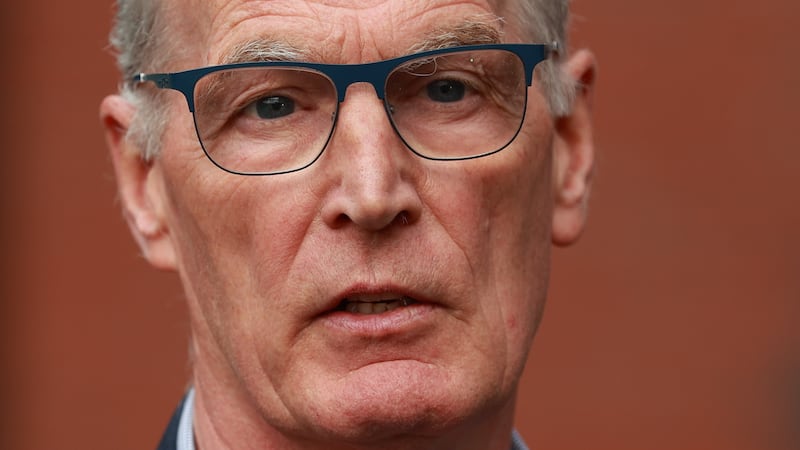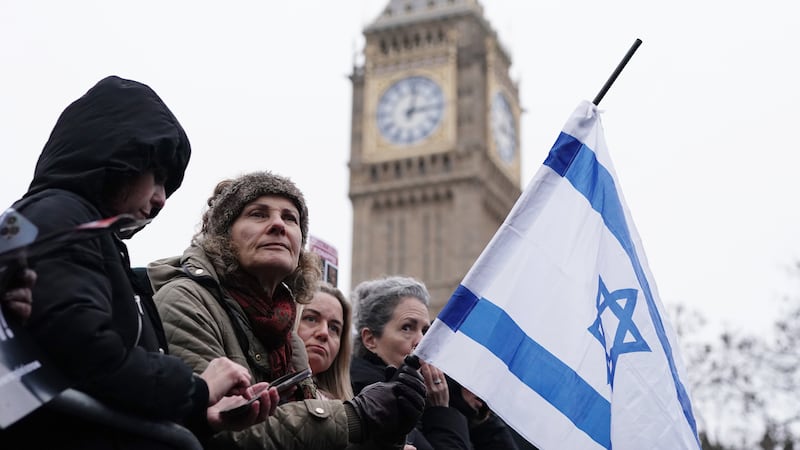Northern Ireland’s hospitals and schools risk running out of food when post-Brexit Irish Sea trade arrangements are fully implemented, a Stormont minister has claimed.
A grace period that limits the level of red tape required to move retail food products from Britain to Northern Ireland runs out at the end of March.
Once that exemption expires supermarkets will have to comply with more rigorous animal health certification processes under the terms of Brexit’s Northern Ireland Protocol.
With depleted supermarket shelves already in evidence in Northern Ireland with the lighter-touch trade controls, Agriculture Minister Edwin Poots warned of a “major crisis” once the grace period ends.
“It was made very clear to us by the suppliers to both hospitals and schools that if the current arrangement for supermarkets isn’t extended in a few months’ time that they will not be able to supply our hospitals and schools with food,” he told BBC Radio Ulster’s Nolan Show.
Read More: DUP's Sammy Wilson should apologise for 'chippy' remark says SNP's Ian Blackford
“That is a major crisis and I have raised this with (senior Cabinet minister) Michael Gove.
“Seriously, are we going to have a situation where our hospitals and schools are not able to feed the children at school, they’re not able to feed their patients?
“That is an outrageous situation that we in Northern Ireland have been put in as a result of the protocol negotiated between the UK Government and the European Union.”
A spokeswoman for the Department of Health said it had not received any reports from any of the north's health trusts flagging major issues related to food shortages or supply difficulties.
"The Business Services Organisation (BSO) has informed the department that there has not been any major disruption on food supplies into NI hospitals due to EU exit," she added.
"They have confirmed that there have been some minor delays, and a small number of products have had to be substituted with equivalents, but this is only for a temporary period."
She said the BSO had worked with trust catering managers to agree "a core list of ambient products" that they have asked suppliers to reserve an additional four to six weeks of stock.
She said trusts also stood ready to change menus should that be required.
"It was further confirmed by BSO that their food contracts will also allow for flexibility and substitution for example, a move from fresh to tinned or frozen for example should that be required," the spokeswoman added.
"BSO has confirmed that their suppliers do have a range of contingencies in place such as additional stockholding, use of alternative transit routes or moving to local supply."
Under the terms of the Northern Ireland Protocol, the region has remained in the single market for goods. That requires strict health checks on animal-based food products being shipped from Great Britain.
Some products are prohibited from entering Northern Ireland at all under single market rules.
Sausages and other chilled meats, which are on that banned list, have been granted a six-month grace period to enable their import from Britain to continue until June using temporary Export Health Certificates.
Northern Ireland also applies EU customs rules at its ports, requiring customs declarations on goods moving from Britain.
Mr Poots rejected suggestions his party was partly to blame for the situation, given its support for Brexit and its opposition to the withdrawal deal negotiated by former prime minister Theresa May.
Mrs May’s version of Brexit did not include the same economic barriers on British-NI trade, with the Northern Ireland Protocol later negotiated by her successor Boris Johnson.
Mr Poots insisted those who advocated the protocol, as a means to keep trade flowing freely across the Irish border, should shoulder responsibility for the “unmitigated failure” of the new trading arrangements.
He singled out the Irish Government, Sinn Fein, the SDLP and Alliance Party for criticism.
Senior DUP figures have urged the British Government to invoke the Article 16 mechanism within the Northern Ireland Protocol to halt its operation.
The Prime Minister has said he will not hesitate to invoke the article if the protocol is causing economic harm, however he has characterised the disruption witnessed since the end of the transition period as “teething problems”.
Northern Ireland Secretary Brandon Lewis has denied the existence of a new Irish Sea trade border.
Sinn Fein MP Chris Hazzard accused Mr Poots of “talking up a problem”.
“He’s peddling panic needlessly to divert the gaze of angry supporters who are angry at Irish Sea Border,” he tweeted.
Earlier, DUP MP Sir Jeffrey Donaldson warned that the disruption risked breaching the terms of the Good Friday Agreement.
Sir Jeffrey told BBC Radio 4’s Today programme: “The protocol is damaging the Northern Ireland economy and if it damages the Northern Ireland economy it actually undermines the Good Friday Agreement.
“And furthermore, that agreement makes clear that Northern Ireland will remain an integral part of the United Kingdom unless the people of Northern Ireland vote otherwise.
“Therefore this breaches a fundamental element of the Good Friday Agreement by increasingly separating Northern Ireland from Great Britain in trading terms – our biggest trading partner, our biggest trading market, and that simply doesn’t help anyone in Northern Ireland.”
In an extraordinary speech in the Commons yesterday, North Antrim MP Ian Paisley claimed the north's trade had been "ruined" by the Northern Ireland Protocol - part of the Brexit agreement between the EU and UK which keeps the north in the EU's customs union for goods.
Trade from Britain to the north, including essential food supplies, has been severely disrupted since the Protocol kicked in on January 1, with many shoppers witnessing empty supermarket shelves.
Although a three-month grace period was introduced in the new year for businesses in Britain sending parcels to customers in Northern Ireland, most business to business shipments now require a customs declaration.
British Prime Minister Boris Johnson said he was assured goods were flowing "effectively" from Britain to the north.
But Mr Paisley said the comment was "an insult".
"I must ask, what did we do to members on those benches over there to be screwed over by this protocol?" he told the Commons.
"It has ruined trade in Northern Ireland and it's an insult to our intelligence to say it's a teething problem."
"What did we do to members on those benches over there to be screwed over by this protocol?"
— Channel 4 News (@Channel4News) January 13, 2021
DUP MP Ian Paisley says the Northern Ireland Protocol has "ruined trade" between NI and GB - as he criticises Boris Johnson for saying it is experiencing post-Brexit "teething problems". pic.twitter.com/S5BcSfQWtA








